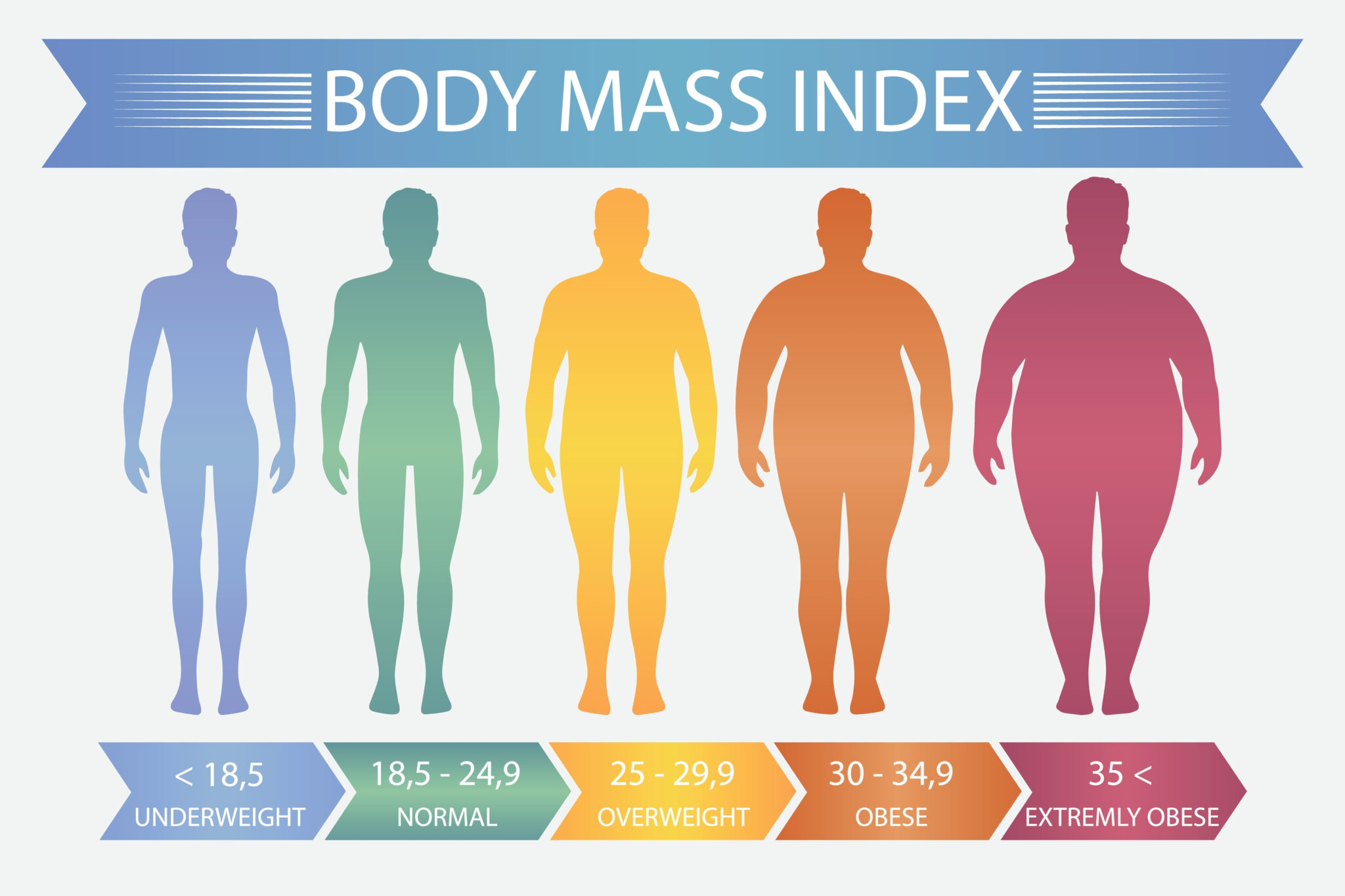BMI CALCULATOR
Understanding Eligibility→
for bariatric surgery
The journey to bariatric surgery begins with understanding whether you’re a suitable candidate. Weight isn’t the only eligibility consideration; the determination encompasses a range of criteria ensuring that the benefits of surgery outweigh the risks.
WEIGHT AND BMI CRITERIA
A Body Mass Index (BMI) at or above 40, or a BMI over 35 accompanied by severe obesity-related health issues like type 2 diabetes, hypertension, or sleep apnea, typically sets the threshold for eligibility. This criterion
Read More
is grounded in addressing obesity and its debilitating health ramifications.
HEALTH AND LIFESTYLE
A long-term struggle with weight, evidenced by previously recorded attempts at weight loss through diet and exercise, underscores a commitment to lifestyle change, a crucial factor in post-surgery
Read More
success. Moreover, candidates should be free from conditions that could complicate surgery.
AGE AND OVERALL HEALTH
While age can be a factor, with most candidates falling between 18 and 70 years, exceptions exist, highlighting the importance of individual health assessments over rigid age limits. This is why we do a thorough check of
Read More
potential candidate’s health history and other metrics. Every patient is individually assessed.
WEIGHT AND BMI CRITERIA
A Body Mass Index (BMI) at or above 40, or a BMI over 35 accompanied by severe obesity-related health issues like type 2 diabetes, hypertension, or sleep apnea, typically sets the threshold for eligibility. This criterion is grounded in addressing obesity and its debilitating health ramifications.
Health and Lifestyle
A long-term struggle with weight, evidenced by previously recorded attempts at weight loss through diet and exercise, underscores a commitment to lifestyle change, a crucial factor in post-surgery success. Moreover, candidates should be free from conditions that could complicate surgery.
Age and Overall Health
While age can be a factor, with most candidates falling between 18 and 70 years, exceptions exist, highlighting the importance of individual health assessments over rigid age limits. This is why we do a thorough check of potential candidate’s health history and other metrics. Every patient is individually assessed.
BMI Chart – Adults (Age 20+)
| BMI | Weight Status |
| Below 18.5 | Underweight |
| 18.5 – 24.9 | Normal or Healthy Weight |
| 25.0 – 29.9 | Overweight |
| 30.0 and above | Have Obesity |
BMI Chart – Children and Teens* (Ages 2 to 19)
*Children and teens require age- and sex-specific percentiles to interpret BMI. Please use the CDC BMI-for-age calculator or consult your healthcare provider.
| Weight Status | Percentile Range |
| Underweight | <5th percentile |
| Normal or Healthy Weight | 5th to <85th percentile |
| Overweight | 85th to <95th percentile |
| Have Obesity | 95th percentile or greater |
What Are the Benefits of→
Metabolic and Bariatric Surgery?
Metabolic and bariatric surgery offers a wide array of benefits, significantly impacting both health and quality of life. Here’s how:
1. Sustained Weight Loss
One of the primary advantages is sustained weight loss. These procedures alter the digestive system to help individuals maintain long-term weight loss, often shedding a significant percentage of excess weight. This transformation not only boosts confidence but also enhances daily physical capabilities.
2. Improved Health Conditions
Many patients experience marked improvements or even complete resolution of obesity-related conditions. Key improvements often include:
- Type 2 Diabetes: Many patients can reduce or even eliminate their need for diabetes medication.
- Heart Health: Lower risks of heart disease can be achieved by improving cholesterol and blood pressure.
- Sleep Apnea: Relief from sleep apnea often occurs, leading to better sleep quality and overall energy.
3. Enhanced Quality of Life
Beyond physical health, the positive impact extends to mental and emotional well-being. Many individuals report improved mood, decreased depression, and greater engagement in social and physical activities. This can lead to a more fulfilling and active lifestyle.
4. Increased Longevity
Studies suggest that this surgery can increase life expectancy by reducing risks associated with severe obesity and its complications. This means that patients not only add years to their lives but also life to their years.
5. Boosted Confidence and Self-Esteem
The transformation in appearance and abilities can significantly enhance self-image and self-esteem. This newfound confidence frequently spills over into other areas, encouraging patients to pursue new opportunities and adventures.
In summary, metabolic and bariatric surgery is not just about weight management; it encompasses a broad spectrum of benefits that enrich both physical and psychological health. Through sustained weight loss, improved medical conditions, and enhanced quality of life, patients can look forward to a brighter, healthier future.
Impacts of→
Obesity
Obesity significantly impacts both the body and overall health, leading to a range of serious issues.
Physical Effects of Obesity
- Joint Strain: Excess weight places additional stress on joints, often leading to conditions like osteoarthritis.
- Respiratory Problems: Obesity can cause breathing difficulties, including sleep apnea and reduced lung capacity.
Health Ramifications
Obesity is linked to numerous health conditions that can severely affect quality of life:
- Cardiovascular Disease: Being overweight increases the risk of high blood pressure and heart disease.
- Diabetes: Type 2 diabetes is more prevalent among individuals with obesity due to insulin resistance.
- Mental Health: The psychological impact includes increased risk of depression and anxiety.
Understanding these impacts is crucial for addressing obesity effectively and implementing strategies to mitigate its effects.
Factors to Consider→
Before Bariatric Surgery
Beyond eligibility, it’s essential to consider the broader spectrum of factors influencing your decision to undergo bariatric surgery:
- Understanding the Procedures: Familiarize yourself with different bariatric surgery procedures to find the one that aligns best with your personal health goals.
- Benefits and Risks: Weigh the benefits of metabolic and bariatric surgery against potential risks. This includes considering how surgery could alleviate obesity-related diseases and what postoperative challenges you might face.
- Lifestyle Adjustments: Prepare for significant lifestyle changes post-surgery. Understanding “Life After Bariatric Surgery” will help set realistic expectations for recovery and long-term success.
- Professional Guidance: Consult with experts to answer any lingering questions. Resources like “Find a Surgeon” and FAQs provide invaluable insights into the surgical process and aftercare.
- Special Considerations: Whether you’re exploring “Medical Tourism” or surgery for specific conditions like diabetes, it’s crucial to consider additional factors that may impact your decision.
- Impact of Obesity: Reflect on how obesity currently affects your health and body. This reflection can be a powerful motivator and guide in your decision-making process.
By addressing these varied factors, you can make a well-informed choice about whether bariatric surgery is the right path for you.
Post-Surgery→
Lifestyle Changes
After surgery, patients can expect significant lifestyle changes that require commitment and adaptability.
- Dietary Adjustments: Patients will need to embrace a new, nutritionally balanced diet. This often includes smaller portion sizes and a focus on protein-rich foods.
- Exercise Routine: Regular physical activity becomes a crucial component of maintaining weight loss and overall health.
- Mental Health: Emotional and psychological changes are common. Support groups and counseling can be beneficial during this transition.
This ensures that the focus remains on achieving long-term health improvements and enhancing quality of life. As patients adapt to these changes, they often find a renewed sense of energy and well-being, making the initial challenges well worth the effort.
Is Surgery→
Right for You?
Deciding if metabolic and bariatric surgery is right for you involves more than ticking off boxes on a checklist. It’s about preparing for a life-changing transformation. Here are some additional aspects to consider:
- Emotional and Mental Readiness: Surgery is not just a physical journey but an emotional one. Are you prepared for the changes in lifestyle and self-perception?
- Consulting Healthcare Professionals: Engage with your healthcare provider to explore the risks and benefits specific to your health scenario. Personalized advice is crucial.
- Understanding Risks and Benefits: Weigh the potential health improvements against possible complications. This surgery is a tool, not a quick fix.
- Post-Surgery Commitments: Are you ready for the dietary changes and follow-up care needed to ensure long-term success?
- Personal Success Stories: Hearing from those who have walked this path can provide valuable insights and motivation.
Ultimately, determining if surgery is right for you is a personal decision that requires careful consideration of both your physical and mental health. Always seek guidance from professionals to help navigate this complex journey.
Limitations of BMI→
To Measure of Body Fat
While BMI is a helpful screening tool, it has several limitations to keep in mind. For starters, BMI calculations aren’t able to distinguish between muscle and fat—so particularly athletic individuals (think: your favorite gym enthusiast or NFL linebacker) may appear “overweight” or “obese” on paper, even if their body fat is quite low.
Other factors BMI doesn’t account for include age, sex, and differences in bone density or overall body composition. Someone with a naturally larger frame or denser bones may have a higher BMI without excess body fat. In short, BMI offers a broad snapshot, but your overall health should always be viewed through a more personalized, comprehensive lens in consultation with your medical provider.

Bariatrics Clinic
615.425.0550
393 Wallace Rd Ste 301, Bldg A
Nashville, TN 37211
M-F 7:30 am - 4:30 pm

